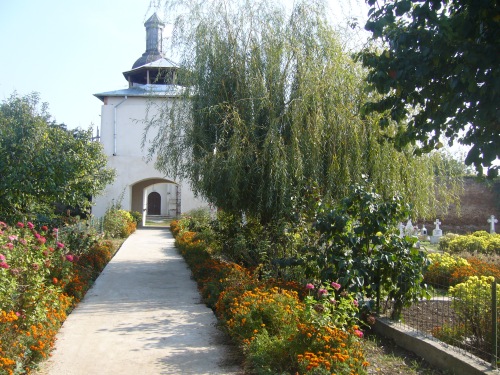Three churches in the
heat yesterday with Mihai, within twenty miles of Bucharest. Cernica, Plătăreşti and Negoiesti.
Cernica I have been to a couple of times before. It is close to Bucharest and therefore well-known. Cernica is a monastery , in a beautiful setting
on a lake, which contains three churches, the principal one being early 19th
century. The lake has good fishing and
besides the monastery is a forest. When I first came in 1999, the village felt
very remote but it now has a certain number of big houses built in the usual
deplorable style, one imagines, inhabited by customs officials and
colonels of police.
Across the lake, one owner of a large house is burning tyres, which make that unmistakable dark heavy smoke. I wonder why people burn tyres. Dogs sleep in the hot sun. This,
despite the big houses far off, is a lovely serene place, the profound Romania.
 |
| Plătăreşti |
 |
| Plătăreşti, painting of St Mercurie |
Plătăreşti under a Mexican sun. The church dates from 1646,
in the reign of Matei Basarab, and was fortified against the Turk. It needs renovation. The outer wall of the
monastery is in great disrepair. In the curtilage of the monastery four old
women, dressed in old clothes, sit under the shade provided by a metal shelter
and chat. They are employed by the monastery and a funeral has just taken
place.
Plătăreşti is a fine brick church but most interesting for
its wall paintings. Especially the painting of St Mercurie which dates from
1649 and is in very good condition. It is nothing at all like an icon and is very
much the sort of painting one might expect to see in Italy. St Mercurie looks like a character from Ariosto. I wonder who he was.
 |
| Negoiesti |
Negoiesti was also a fortified monastery, with thick brick walls, now in disrepair, but now it is a parish church. These churches and monasteries, as with the fortified churches in Transylvania, served a defensive purpose as well as a religious one. The parish priest
told us that after three years (he thought that a long time but in fact he was
lucky) he had succeeded in getting EU funds to have the church renovated. The church’s interior was restored by the
famous 19th century painter Constantin Lecca and the iconostasis
(what in England would be called the reredos) is exquisite. He chose a wonderful shade of blue for it. Unfortunately some of Lecca's paintings have been badly damaged by 'an inundation'. Two thousand souls
live in the parish of whom perhaps thirty come to Mass, said the priest, though for important
holidays each family sends one representative to church.
 |
| Negoiesti |
Romanians are not good at church attendance but attendance figures
do not reflect the extent to which people here believe. Belief in the Orthodox
religion is the Romanian default setting. It was so under Communism too and under Communism there were more reasons to believe in an anti-materialistic philosophy and fewer things to distract from religious belief. Here in the Regat is
the Byzantine Christian Near and Middle East, an arc that stretched
from the Danube to the Holy Land, Mesopotamia and North Africa, before the Muslims came.
½



%20(12).jpeg)

Really lovely. Mihai sounds interesting too. A.
ReplyDelete